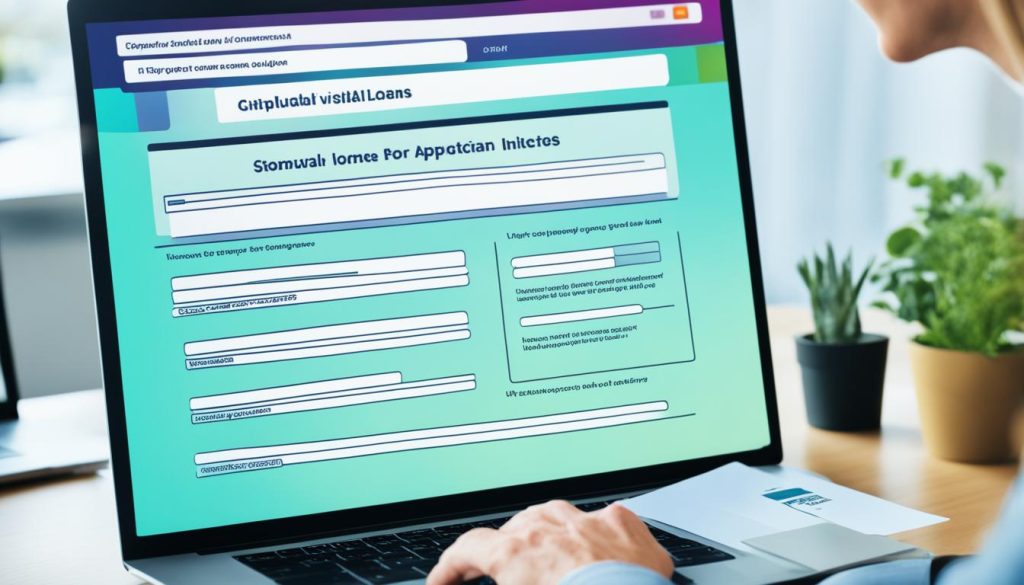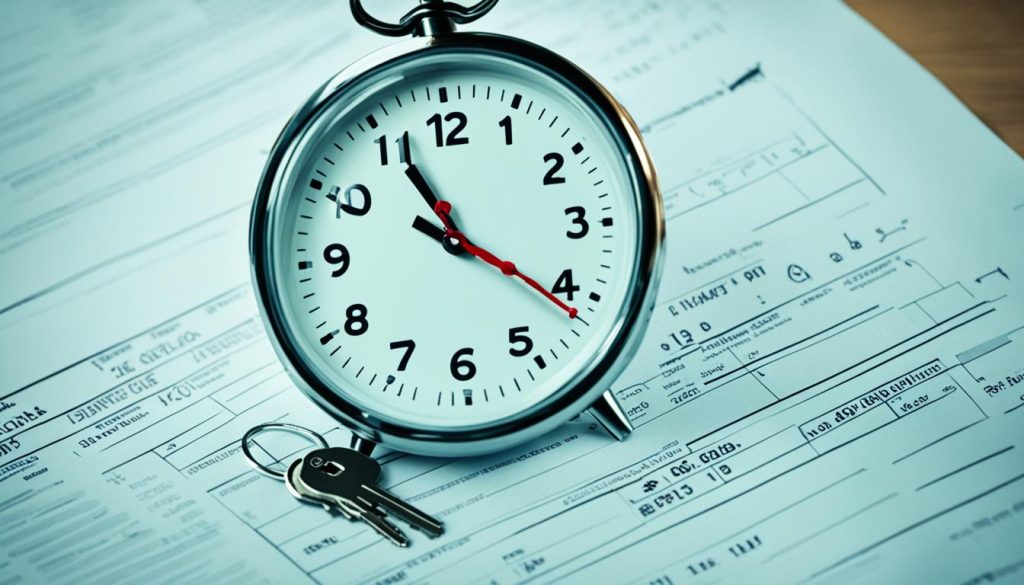Getting a mortgage pre-approval is a key first step in buying a home. It shows how much you can borrow and what loan type you might get. This step is more serious than just pre-qualifying. It checks your finances, like your income, assets, and credit score1.
After you go through the pre-approval process, you get a pre-approval letter. This letter proves to real estate agents and sellers that you’re a serious buyer. It gives you an edge in the competitive housing market.
Key Takeaways
- Mortgage pre-approval is a critical first step in the homebuying process, providing insights into your borrowing power and eligibility.
- Pre-approval involves a thorough verification of your finances, including credit score, income, and assets, unlike the more casual pre-qualification.
- A pre-approval letter shows sellers you’re a serious buyer, increasing your competitiveness in the housing market.
- Lenders typically prefer borrowers with a credit score of at least 620 and a debt-to-income ratio of 36% or less1.
- Preapproval applications only count as one inquiry if submitted within a 45-day window1.
Understanding Mortgage Pre-approval
Starting your journey to buy a home often begins with getting a mortgage pre-approval. This step is more detailed than just pre-qualifying, as lenders check your finances closely2.
What is Mortgage Pre-approval?
Getting a mortgage pre-approval means a lender looks at your finances, income, and debts to see how much they can lend you3. They check your credit, income, and your debt compared to your income (DTI) to figure out what loan you might get3. This gives you a clear idea of how much you can spend on a home, helping you shop within your budget2.
The Difference Between Pre-qualification and Pre-approval
Pre-qualification and pre-approval both help you understand how much you can borrow, but they’re not the same2. Pre-qualification is a quick check based on what you tell the lender, giving a rough idea of your loan potential2. On the other hand, pre-approval is a deeper check, including a credit review and looking at your documents, giving a more precise view of what you can borrow2.
Lenders often use the terms pre-qualification and pre-approval the same way2. But, pre-approval is the better choice because it checks your financial details, credit, and asks for things like pay stubs and tax returns2.
Getting pre-approved shows you know how much you can borrow, helping you make smart choices when buying a home2.
“A mortgage pre-approval letter adds credibility to offers and demonstrates your ability to afford a mortgage to sellers.”
| Pre-qualification | Pre-approval |
|---|---|
| Provides a general estimate based on self-reported financial information | Involves a more rigorous process, including a credit check and documentation review |
| Less reliable than pre-approval | More accurate and credible assessment of borrowing capacity |
| Ideal for touring properties and getting an informal estimate | Suitable for preparing to buy and understanding loan options |
Pre-approval Process: Step-by-Step Guide
The pre-approval process is key to buying a home. It shows how much you can borrow and makes you stand out in the market. Here are the main steps to get pre-approved for a mortgage.
Check Your Credit Score and History
First, look at your credit score and history. Your credit score is vital as lenders check it to see if you’re good for a loan. Make sure to fix any mistakes on your credit report to show your true financial health.5
Calculate Your Debt-to-Income Ratio
Then, figure out your debt-to-income (DTI) ratio. This is how much of your income goes to paying debts. Lenders like a DTI of 36% or less6. To find your DTI, add up your monthly debt payments and divide by your income.
Gather Financial Documents
Next, collect the financial documents you need. Lenders want to see tax returns, pay stubs, and bank statements to check your income and assets5. Having these documents ready makes the process faster and shows you’re ready.
Contact Multiple Lenders
Finally, talk to several lenders to compare offers. This helps you find the best mortgage terms57. Be ready to share your credit score, DTI ratio, and financial documents with them. This gives them a clear picture of what they can offer you.
By following these steps, you’re on your way to getting pre-approved and moving forward in buying a home.
“The pre-approval process is a critical first step in buying a home, as it helps you understand your borrowing capacity and position you as a serious buyer.”
Benefits of Getting Pre-approved
Getting pre-approved for a mortgage loan is a key step in buying a home8. This process offers many benefits. It makes finding a house easier, makes your offer stronger, and spots financing problems early.
Streamlines House-hunting
With a pre-approval, you know your budget and loan options9. This lets you focus on homes you can afford, saving time and effort9. It also gives a rough idea of your borrowing power, which is great for first-time buyers.
Stronger Offer for Sellers
A pre-approval letter shows sellers you’re a serious buyer, making your offer more appealing10. Being pre-approved gives you an edge in negotiations and lets you make strong offers quickly10. Agents prefer working with pre-approved buyers, as it makes finding the right home easier10. Sellers like pre-approved buyers too, as it cuts down on negotiation risks.
Identifies Potential Issues Early
The pre-approval process checks your finances closely, including your credit score and income8. This review can spot financial problems early, letting you fix them before applying for a loan8. It’s a way to protect both you and the lender, ensuring you don’t take on more debt than you can handle8.
Getting pre-approved helps you find a home faster, strengthens your offer, and fixes financing issues early. This step is crucial for becoming a homeowner8910.
Timing Your Pre-approval
Getting a mortgage pre-approval is a key step in buying a home11. It’s best to apply for pre-approval at the start of your search. This lets you know how much you can borrow and helps set a budget11. The process usually takes a day to a few weeks after you apply11. On average, it’s about seven to 10 days11.
Having a pre-approval letter shows sellers you’re a serious buyer12. It gives you an edge when making an offer12. With pre-approval, you’re more likely to be taken seriously in the buying process. You’ll know your budget, including down payment, interest rates, and approved areas12.
Pre-qualification is quicker, but pre-approval checks your finances more deeply13. The time it takes can vary, from the same day to a week12. Be ready for the loan amount to differ from what you expected11.
If you’re waiting for pre-approval, check in with your lender11. Pre-approval usually lasts 2 – 3 months13. Apply for it when you’re actively looking for homes, but not too early13.
In summary, the timing of your mortgage pre-approval is key for finding a home12. Understanding the process helps you stand out as a serious buyer. This sets you up for a successful home purchase12.
Pre-approval Process: Online Options
In today’s digital world, getting a mortgage pre-approval online is easy. You can choose from Prequalified Approval and Verified Approval14.
Prequalified Approval
The Prequalified Approval is quick and only needs a credit check. You can do it all online, which is great for those who are busy1516.
Verified Approval
For a detailed pre-approval, the Verified Approval looks at your finances closely. This might take a bit longer but gives you a stronger pre-approval letter1516.
Lenders like Rocket Mortgage let you apply for pre-approval online with both options. This makes applying easy and gives you a pre-approval letter for when you’re looking at homes141516.
“The convenience of online pre-approval options has revolutionized the homebuying process, empowering buyers to take control of their home loan journey.”
Choosing Prequalified or Verified Approval can save you time. It also gives you the documents you need to make your offer strong in a tough housing market1516.
Additional Considerations for Pre-approval
Expiration and Renewals
Understanding that mortgage pre-approval letters expire in 60 to 90 days is key17. If you haven’t found a home, you’ll need to renew the process with new financial info. This is vital if your financial situation has changed, as it could affect your loan terms18.
The pre-approval process checks your credit history, income, assets, and debts deeply19. If these have changed, tell your lender and go through the pre-approval again. This makes sure your pre-approval matches your current finances, helping you make a strong offer on a home.
Having an active pre-approval is key in today’s competitive market18. Pre-approved buyers have an edge over others, as sellers like to work with them19. Keeping your pre-approval current shows you’re serious and ready, increasing your chances of getting your dream home171918.
Conclusion
Getting a mortgage pre-approval is key to buying a home. It helps you understand the process and its benefits. This gives you confidence and a competitive advantage20. A pre-approval letter shows sellers you’re a serious buyer. It also helps you focus your search and spot financial issues early21. You can get pre-approved online or through a traditional lender. This step prepares you for finding and buying your dream home.
The pre-approval process means you’ll share your financial info and have your credit checked21. This shows how much you can borrow and helps you understand your budget. It also makes you stronger in negotiations with sellers22. Fixing any financial issues early makes the buying process smoother and faster.
A pre-approval is just the start of getting ready to buy a home. Keep an eye on home prices and inventory as you look for your home. Work with your lender and real estate agent to make the process smoother21. By staying informed and proactive, you’re on your way to getting your dream home.
FAQ
What is mortgage pre-approval?
What’s the difference between pre-qualification and pre-approval?
How do I start the pre-approval process?
What are the benefits of getting pre-approved?
When is the best time to get pre-approved?
What are the online options for the pre-approval process?
What happens if my pre-approval expires?
Source Links
- How to Get Preapproved for a Mortgage – NerdWallet
- Mortgage Preapprovals Vs. Prequalifications: Which Should You Get?
- Mortgage Pre-approval: Everything You Need to Know | LendingTree
- What Is a Mortgage Preapproval?
- How to Get Pre-approved for a Mortgage
- How To Get Preapproved For A Mortgage | Bankrate
- The Mortgage Loan Process: A Step-by-Step Guide
- 5 Benefits of a Mortgage Pre-Approval | Moreira Team Mortgage
- 5 benefits of mortgage pre-qualification | First Financial Bank
- Why Should I Get Pre Approved for a Mortgage? – Capital Bank
- How Long Does Mortgage Pre-approval Take?
- How Long Does it Take to Get a Mortgage Pre-Approval? | CrossCountry Mortgage
- How Long Does A Mortgage Preapproval Last?
- How to Get Pre-approved for a Home Loan in 6 Easy Steps
- How To Get A Mortgage Preapproval
- How to get preapproved for a mortgage
- 5 Things You Need to Be Pre-Approved for a Mortgage
- Get a preapproval letter | Consumer Financial Protection Bureau
- Pre-Qualified vs. Pre-Approved: What’s the Difference?
- 9 Steps Of The Mortgage Process | From Preapproval To Closing
- 6 Steps of the Mortgage Loan Process: From Pre-Approval to Closing
- Pre-Approval Vs. Clear to Close



